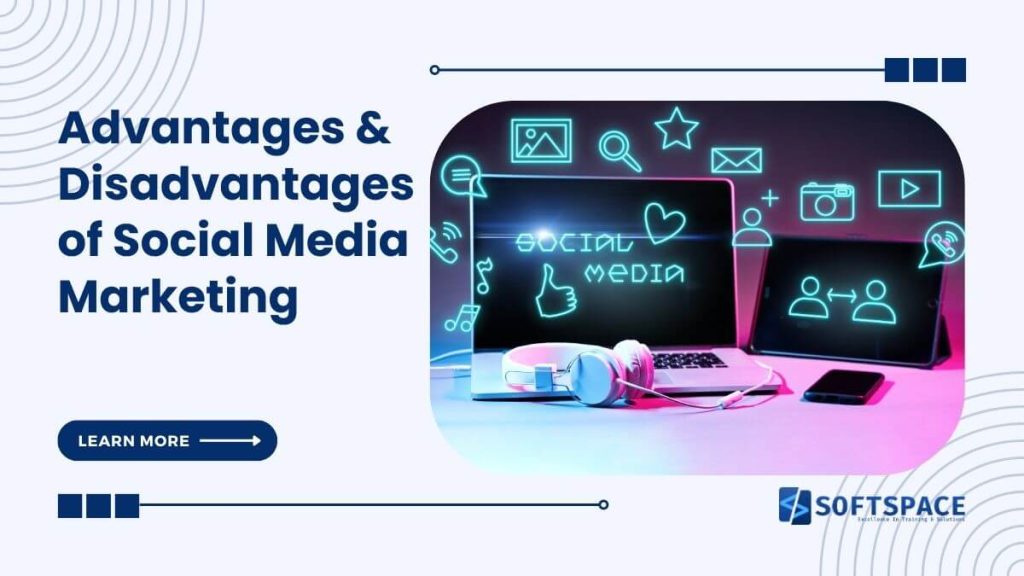In the digital age, social media marketing has emerged as a powerful tool for businesses to connect with their audience and promote their products and services. This strategy leverages the popularity and accessibility of social media platforms to engage with potential customers.
This blog will explore the advantages and disadvantages of social media marketing and underscore the importance of having a well-planned strategy.
What is Social Media Marketing
Social media marketing is a digital strategy that harnesses the influence of social media platforms like Facebook, Instagram, and Twitter to promote products, services, or brands. It involves creating and sharing compelling content, engaging with a target audience, and often using paid advertising to expand reach.
The key is to connect with potential customers, build brand recognition, and achieve marketing goals through a variety of tactics, including content creation, audience targeting, and analyzing performance data.
Social media marketing has become a vital part of the modern marketing landscape, offering businesses and individuals a powerful means to reach and interact with their audience in real time, shaping their online presence and fostering customer loyalty.
Social media marketing is a digital marketing strategy that involves the use of social media platforms to promote products, services, brands, or content. It leverages the popularity and reach of social media platforms to connect with a target audience, engage with them, and ultimately achieve marketing and business objectives. Here are some key aspects of social media marketing:
- Content Creation: Social media marketing starts with the creation of engaging and relevant content, such as text, images, videos, and other multimedia that resonates with the target audience.
- Platform Selection: It involves choosing the right social media platforms for your business or goals. This could include platforms like Facebook, Instagram, Twitter, LinkedIn, Pinterest, TikTok, and more.
- Profile Setup and Optimization: Creating and optimizing social media profiles with accurate information, appealing visuals, and relevant keywords to attract and inform potential followers.
- Audience Targeting: Identifying and understanding your target audience’s demographics, interests, and behaviours to tailor your content and messaging accordingly.
- Posting and Scheduling: Consistently posting content on social media channels and using scheduling tools to reach your audience at the most optimal times.
- Engagement: Interacting with your audience through likes, comments, direct messages, and other means to build a community and foster relationships.
- Paid Advertising: Utilizing paid advertising options on social media platforms to reach a broader or more specific audience. This can include promoted posts, sponsored content, and targeted ads.
- Analytics and Insights: Monitoring and analyzing the performance of your social media campaigns through metrics like reach, engagement, clicks, conversions, and more. This data helps in refining and optimizing your strategy.
- Influencer Marketing: Collaborating with social media influencers to leverage their established follower base and credibility to promote your products or services.
- Customer Service: Addressing customer inquiries, concerns, and feedback through social media channels, enhancing customer satisfaction and loyalty.
- Community Building: Fostering a sense of community among your followers can lead to user-generated content, advocacy, and increased brand loyalty.
- Social Listening: Monitoring social media platforms for mentions of your brand or related keywords to understand public sentiment and address issues or opportunities.
Importance of Social Media Marketing in Today’s Business World
Social media marketing has become an integral part of the modern business landscape. In a world where billions of people are active on social media platforms, ignoring these channels would mean missing out on a vast audience.
Businesses recognize the importance of establishing a strong online presence to connect with their target demographic, strengthen brand recognition, and ultimately drive sales and revenue.
So, let’s start and deep dive into the advantages and disadvantages of social media marketing for your business and presence to build a recognizable brand.
Table of Contents
Advantages and Disadvantages of Social Media Marketing
Advantages
Large Audience Reach
The advantage of a large audience reach cannot be overstated. Social media platforms, such as Facebook, Twitter, and Instagram, have evolved into global communities with billions of active users. For example, Facebook boasts over 2.8 billion monthly active users as of 2022. This means that businesses, regardless of their size, can tap into this immense pool of potential customers and target specific demographics, reaching people who are genuinely interested in their products or services.
Direct Connection with the Audience
Social media platforms facilitate direct, real-time interaction between businesses and their customers. Unlike traditional advertising, which often operates as a one-way communication, social media enables companies to engage in conversations with their audience. This personal connection can foster trust and loyalty. Consider a scenario where a customer tweets a query to a clothing brand about product availability. A prompt and helpful response can leave a positive impression and encourage the customer to make a purchase.
Cost-effective Advertising
Social media marketing is often far more cost-effective than traditional advertising channels. For instance, while running a TV commercial can be prohibitively expensive for small businesses, social media advertising allows them to set their own budgets and reach their target audience without the hefty price tag. Additionally, advertising platforms, like Facebook Ads, provide tools to ensure the ad budget is used efficiently, targeting users based on demographics, interests, and behaviour.
Building Brand Loyalty
Consistent and meaningful interactions on social media can build brand loyalty. When businesses engage with their followers, share valuable content, and respond to feedback, they create a sense of community and trust. Customers are more likely to return to a brand they feel connected to. For example, a cosmetics company that regularly posts makeup tutorials and responds to customer inquiries not only enhances brand loyalty but also becomes a go-to resource for beauty enthusiasts.
Access to Paid Advertising Services
Social media platforms offer advanced paid advertising services, ensuring content reaches the right audience. Instagram, for instance, provides businesses with the tools to target users based on various factors, such as age, location, interests, and online behaviour. This precise targeting maximizes the effectiveness of advertising campaigns, leading to higher conversion rates and a better return on investment.
Ability to Create Organic Content
Creating engaging organic content is a key element of social media marketing. This content can take various forms, including informative blog posts, captivating images, humorous videos, or inspiring stories. For example, a travel agency might post stunning photos of exotic destinations, enticing its followers to dream about their next vacation. Organic content serves not only to inform and entertain but also to establish a brand identity and provoke interest. That said, most pieces of compelling organic content are usually short and sweet so readers can go through them easily. Aim to create such pieces yourself. Use a summarizer for help if needed.
Audience Insights and Market Research
Social media platforms provide valuable data about customer behaviour and preferences. This data allows businesses to understand their audience better, fine-tune their marketing strategies, and create content that resonates with their target demographic. For instance, a restaurant can analyze social media comments to discover which dishes are most popular among its patrons, guiding menu decisions and promotions.
Viral Marketing Potential
Shareable content on social media has the potential to go viral. When a piece of content strikes a chord with the audience and encourages them to share it with their connections, it can quickly gain exponential exposure. Viral marketing doesn’t require substantial advertising budgets; instead, it relies on the power of engaging and shareable content. For example, the ALS Ice Bucket Challenge went viral, spreading awareness and raising funds for amyotrophic lateral sclerosis research.
Competitive Advantage
Maintaining a strong and consistent social media presence can set a business apart from its competitors. By providing unique and valuable content, promptly responding to customer inquiries, and demonstrating a commitment to social responsibility, a brand can differentiate itself in a crowded marketplace. This distinction can be a powerful competitive advantage that influences consumer choices.
Ability to Foster Brand Advocacy and Build Community
Satisfied customers can become brand advocates, actively promoting a company’s products or services. Through social media, businesses can create and nurture online communities, encouraging customers to share their positive experiences. Consider Apple’s community forums where users help one another with technical issues. This not only builds a sense of belonging but also fosters brand advocacy as customers become advocates for the brand within their networks.
Example of Social Media Marketing Advantages
Let’s consider an example of a small bakery using social media marketing to illustrate its advantages. The bakery, “Sweet Delights,” decides to establish a presence on Instagram and Facebook. They regularly post high-quality images of their delectable pastries and engage with their audience through comments and messages.
This approach leads to several advantages:
- First, they increase brand awareness as their mouthwatering photos are shared, reaching a wider local audience.
- Second, they effectively target local users with ads promoting their special holiday-themed cakes, resulting in a significant increase in holiday orders.
Furthermore, by responding promptly to customer inquiries and reviews, they build a reputation for excellent customer service, which fosters brand loyalty. The bakery also leverages social media to run a contest where customers share their favourite Sweet Delights dessert photos, generating user-generated content and enhancing engagement.
Additionally, through analytics, they identify the most popular pastries, allowing them to adjust their product offerings. Overall, “Sweet Delights” showcases how social media marketing can lead to increased brand recognition, customer engagement, and data-driven decision-making for business growth.
Disadvantages
Oversaturation
The overwhelming amount of content uploaded to social media platforms every minute makes it increasingly challenging for businesses to capture the audience’s attention. With countless posts, images, and videos flooding these platforms, it’s easy for your carefully crafted content to get lost in the noise.
For instance, a small bakery’s Instagram post featuring a delectable dessert might not gain the visibility it deserves due to the sheer volume of food-related posts in users’ feeds.
Algorithm Changes
Social media platforms continually update their algorithms to improve user experience. However, these changes can significantly affect the visibility of your content. For example, Facebook might prioritize posts from friends and family in users’ feeds over business content, reducing the reach of your marketing efforts.
These algorithm shifts can force businesses to adapt their strategies, which can be both time-consuming and frustrating. you need to have a good understanding of Social Media Marketing Strategy to execute it the proper way.
Negative Feedback
Social media is a double-edged sword; it allows for both positive and negative feedback. Negative comments, reviews, or criticisms can be publicly visible and can quickly damage a brand’s reputation. For instance, if a restaurant receives a string of negative comments about poor service on its Facebook page, it can trigger a crisis management situation that requires careful handling to protect the brand’s image.
Time-Consuming
Effectively managing social media accounts and engaging with the audience is a time-consuming task. Creating high-quality content, responding to inquiries, and staying active on multiple platforms requires significant time and resources. Small business owners, in particular, may find it challenging to allocate the necessary time while also attending to other essential aspects of their operations.
Dependence on Platforms
Businesses are reliant on the rules and policies of social media platforms. These platforms can change their policies, affecting how businesses can advertise, what content they can share, and how they can interact with their audience. For instance, sudden changes to Instagram’s advertising guidelines may disrupt a business’s paid marketing strategy.
Difficulty in Measuring ROI
Determining the return on investment (ROI) for social media marketing can be complex. The impact of social media efforts on sales, revenue, or other key performance indicators may not be immediately obvious. It can take time to see tangible results, making it challenging to evaluate the effectiveness of the strategy, especially for small businesses with limited resources.
Control Handed Over to Consumers
Social media empowers consumers, giving them a significant role in shaping a brand’s image and reputation. User-generated content, both positive and negative, can spread quickly and influence how a brand is perceived. A single viral video showcasing a product defect or a negative customer experience can have far-reaching consequences for a business’s reputation.
Slow to Achieve ROI Yet Time-Consuming
Despite being cost-effective, social media marketing often takes time to yield significant returns. For example, a blog post may take months to rank high on search engines and drive substantial organic traffic. This gradual pace of achieving ROI can be challenging, especially for businesses seeking quick results or facing budget constraints.
Understanding Human Nature
Successful social media marketing necessitates a deep understanding of human behaviour and psychology. Misjudged posts or campaigns can lead to backlash, harming a brand’s reputation. Businesses must navigate the complex and sometimes unpredictable nature of online interactions, requiring not only marketing skills but also a keen understanding of human nature.
Example of Social Media Marketing Disadvantages
Imagine a startup restaurant, “Tasty Bites,” that has recently launched its social media presence. One notable disadvantage they encounter is the issue of maintaining privacy and security.
When they create social media accounts, they share information about their restaurant’s location, menu, and hours of operation. Unfortunately, this information may also be accessed by individuals with malicious intent.
In this case, “Tasty Bites” becomes a target for a cyberattack, leading to a data breach that exposes customer information. As a result, the restaurant faces not only a loss of customer trust but also potential legal repercussions and the cost of addressing the security breach.
This example highlights how social media marketing can inadvertently compromise a business’s security and privacy, which is a significant disadvantage that businesses need to consider.
To Conclude
In conclusion, social media marketing has become an essential part of any business strategy in today’s digital age. It offers businesses a large audience reach, direct connection with the audience, cost-effective advertising, building brand loyalty, access to paid advertising services, ability to create organic content, audience insights and market research, viral marketing potential, competitive advantage, and ability to foster brand advocacy and build community.
However, social media marketing also has its disadvantages, such as oversaturation, algorithm changes, negative feedback, time-consuming, dependence on platforms, difficulty in measuring ROI, control handed over to consumers, slow to achieve ROI yet time-consuming, and understanding human nature.
Businesses should summarize the main points of their social media marketing strategy, restate their goals and outcomes, and avoid bringing in new information or topics that have not been discussed in the body of the essay.
By weighing the advantages and disadvantages of social media marketing, businesses can make informed decisions about how to incorporate it into their overall marketing strategy and achieve their marketing goals.

13+ Yrs Experienced Career Counsellor & Skill Development Trainer | Educator | Digital & Content Strategist. Helping freshers and graduates make sound career choices through practical consultation. Guest faculty and Digital Marketing trainer working on building a skill development brand in Softspace Solutions. A passionate writer in core technical topics related to career growth.




